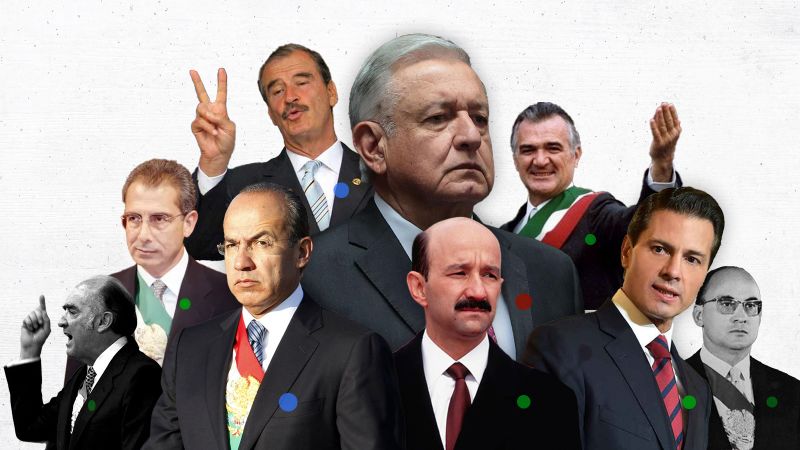México: Sus Presidentes y sus Gobiernos: Un Análisis Histórico de la Presidencia Mexicana
Mexico's history is a rich tapestry woven with the threads of its presidencies. Understanding the impact of each president and their respective governments is crucial to grasping the nation's current political landscape and future trajectory. This comprehensive overview delves into the key figures and their administrations, highlighting significant events and their lasting legacies.
La Época Pre-Revolucionaria: Inestabilidad y Consolidación
Before the Mexican Revolution of 1910, the presidency was characterized by instability and frequent power struggles. While figures like Porfirio Díaz (1876-1880, 1884-1911) established a period of relative peace and economic growth – often referred to as the Porfiriato – his authoritarian rule ultimately sowed the seeds of revolution. His long tenure, however, marks a significant chapter in Mexican history, leaving behind a legacy of both progress and repression. Studying this era provides critical context for understanding subsequent political developments.
Key Aspects of the Pre-Revolutionary Era:
- Economic Growth under Díaz: Focus on infrastructure development and foreign investment.
- Social Inequality: Growing disparity between the wealthy elite and the impoverished masses.
- Political Repression: Suppression of dissent and opposition.
La Revolución Mexicana y sus Secuelas (1910-1940)
The Mexican Revolution was a period of intense upheaval and transformation. Numerous leaders rose and fell, vying for control of the nation. Figures like Venustiano Carranza, Francisco Villa, and Emiliano Zapata, though fighting on different sides, shaped the course of the revolution and its aftermath. The revolution’s impact on Mexican identity and political structures is profound and continues to resonate today.
The Key Players and Their Impacts:
- Venustiano Carranza (1917-1920): Promulgation of the 1917 Constitution.
- Álvaro Obregón (1920-1924): Emphasis on national reconstruction and reconciliation.
- Plutarco Elías Calles (1924-1928): Strengthening of the institutional Revolutionary Party (PRI).
El PRI y el Desarrollo Estabilizador (1940-1980)
The Institutional Revolutionary Party (PRI) dominated Mexican politics for much of the 20th century. This era, often referred to as the desarrollo estabilizador, witnessed significant economic growth and social progress, albeit within a largely authoritarian system. Presidents during this period, including Miguel Alemán Valdés and Luis Echeverría Álvarez, oversaw periods of both economic boom and social unrest.
Characteristics of the PRI Era:
- Economic Growth and Industrialization: Rapid expansion of the Mexican economy.
- Social Programs and Welfare: Improvements in education, healthcare, and infrastructure.
- Authoritarianism and Limited Political Participation: Suppression of opposition and limited democratic processes.
La Transición Democrática y el Siglo XXI
The late 20th and early 21st centuries have seen a dramatic shift in Mexican politics. The PRI's long reign ended, giving way to a multi-party system. Presidents like Vicente Fox (PAN), Felipe Calderón (PAN), and Enrique Peña Nieto (PRI) represent this era of transition and the challenges of consolidating democracy. The current administration under Andrés Manuel López Obrador (MORENA) presents a new chapter in Mexican politics, characterized by significant social and economic reforms.
Challenges of the Modern Era:
- Drug Violence and Organized Crime: A persistent and complex issue.
- Economic Inequality and Social Justice: Addressing the gap between the rich and poor.
- Strengthening Democratic Institutions: Ensuring transparency and accountability.
Conclusion: Un Legado Complejo
The history of Mexico’s presidents and their governments reveals a complex and multifaceted narrative. Understanding this history is essential for comprehending current events and the ongoing challenges facing the nation. Further research into specific presidencies and their policies is encouraged for a deeper understanding of this fascinating and important subject.
Keywords: México, Presidentes de México, Historia de México, Gobierno de México, Revolución Mexicana, PRI, PAN, MORENA, Política Mexicana, Desarrollo Estabilizador, Andrés Manuel López Obrador, Vicente Fox, Felipe Calderón, Enrique Peña Nieto, Porfirio Díaz.
(Call to Action): Share your thoughts on the most impactful Mexican president in the comments below!
